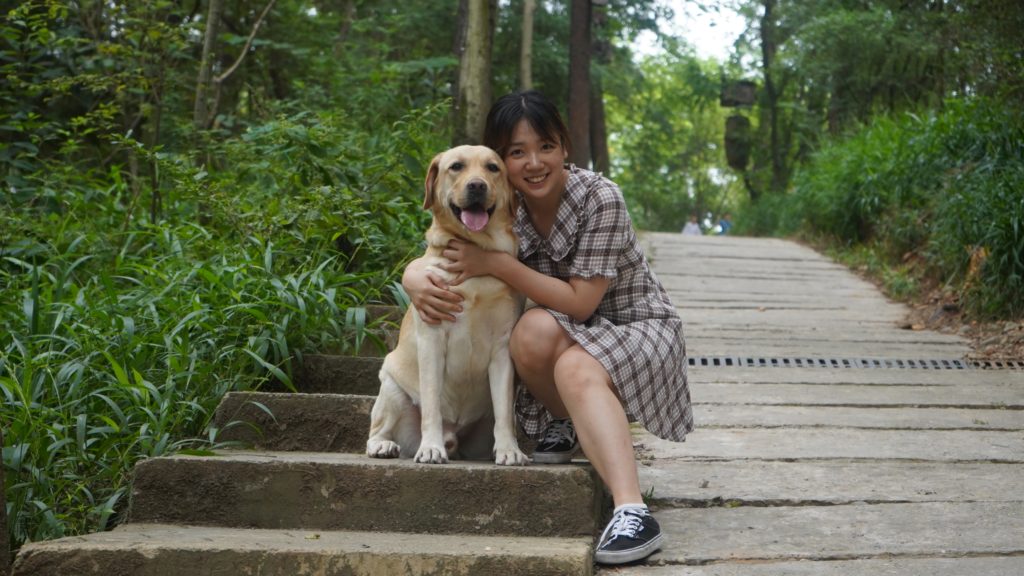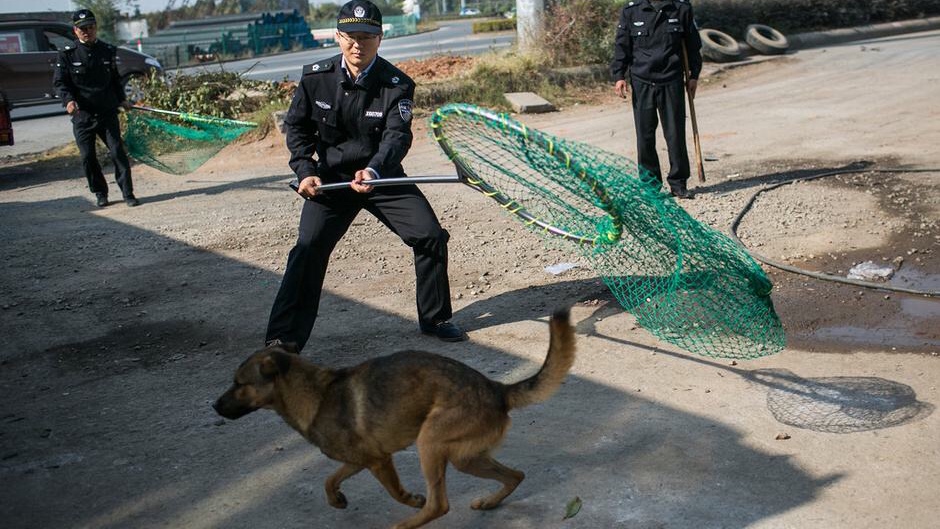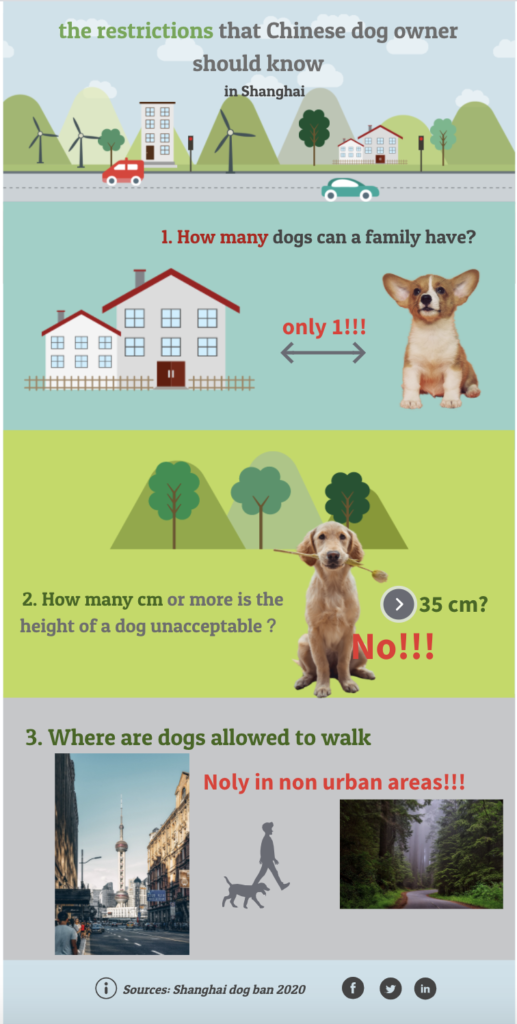Large dogs have become increasingly popular in China, but it can often lead to conflict with neighbours and local government. Just how difficult is it to own a dog in one of the world’s most populous cities.
For Yao Ting, 27, in order to avoid compulsory inspection and prevent his dog from being killed by the police, she has to get up at four o’clock in the morning, leave her warm and comfortable bed to prepare breakfast for herself and her dog–Berber. Then she drives 20 km out of the suburbs to walk the Labrador she has owned for the last five years.
“I’m in a desperate situation because of the government’s latest restrictions on dog ownership, they don’t allow big dogs to appear in any corner of the city. Once found, I will lose my dog forever”, Ting said. One evening just half a month ago, she was playing with her dog in the park, a routine that had been on her schedule for four years. But that day was not as happy as usual. “Berber was discovered by the police, and they warned me that if I didn’t send the dog outside Beijing within 14 days, Berber would be euthanized”, she said.

At that time, Another big dog was also found in the park. it was not accompanied by his owner and was killed on the spot because his resisting behavior to the police. “ I cried loudly and begged the policeman not to take my dog away. I went crazy and took out my legal dog certificates, but they told me that as long as the dogs on the list of prohibited breeds are not allowed to stay in the city”.
Ting have no idea of finding a good solution, and can not find a reliable and suitable person to adopt her dog. “On the one hand, I am looking for such a person, on the other hand, I find that I really can’t leave him”, she said. Therefore, Ting has to take Berber for a walk in the suburbs every morning before dawn, trying to continue to live with her best “friend” without being noticed by others. When talk about the possibility of being discovered by the police, Ting shakes her head, “I’m too scared to imagine it!”.
Ting is not the only one in Beijing who has encountered such a difficult situation. According to the latest statistics of Beijing Pet Love, which is the largest pet protection organization in Beijing, 80% of dog owners have been or are suffering from the impact of this strict dog restriction policy. Only about 16% of dog owners have found a suitable solution to place their dogs. It is worth noting that more than 60% of dog owners do not want to leave their dog.

It is hard to have a big dog in Beijing now. Almost all parts of the city are included in the area where the government has announced a ban on dog ownership. One year ago, The Beijing government has announced new restrictions on dog keeping, dividing almost the entire urban area into restricted dog areas, and has listed 34 breeds of dogs not allowed to have, including Labradors, Alaskan and German shepherd and so on, and also forbidding the raising of all adult dogs whose body height exceeds 50 cm. However, according to a report released by the Chinese Pet Market in 2019, Labrador, Alaskan and Golden Retriever are regarded as the three most popular large dog breeds among Chinese dog owners.
The increasingly stringent official restrictions may have something to do with the increasing uncivilized behavior in society. “The irresponsible behavior of dog owners has led to frequent dog injuries in recent years, in order to protect the life and safety of citizens, it is time for us to take action to regulate dog keeping behavior”, said Lei Wu, a police officer in the Xian Public Security Bureau’s dog keeping office is responsible for handling complaints from the public.
According to a research of China Pet Market in 2018, walking the dog without tying the dog lead, carrying the dog in the elevator, and not cleaning up the pet excrement have become the most uncivilized dog keeping behaviors that disgust Chinese residents.
In fact, across the country, big dog attacks are frequently reported by the news media. In September 2017, People’s Daily reported a news story about two large dogs accidentally fought in a small elevator of a residential building, causing a 5-year-old boy to be seriously injured in his face, while two owners were also in the same elevator, and both of them did not tie the lead to their dogs. In February 2018, Pengpai News reported that three biters without leads killed an 8-year-old girl, and the dog owner lived nearby, unaware of the “escape” of his dogs.
Wu would handle hundreds of complaint letters from the public almost every day. In addition, according to the data released by the Chinese police, there were as many as ten thousand dog bites case happened in 2019 , and there is a rising of 20% over the previous year.
In May 2020, Xi An, one of the major cities in China has announced the strictest dog keeping policy in history to regulate the behavior of dog owners. In addition to stipulating the prohibited breeds and size of dogs, the government also mentioned in the policy advertisement that “say NO to uncivilized dog keeping behaviors”. According to this policy, the community service center will work with the police to register dogs. At the same time, for uncivilized dog breeders who do not listen to dissuasion, their dog registration certificate will be revoked and no more dogs will be raised within 5 years.

These measures seem to give hope to those who have long been against dog ownership. For Min Liu, 45, it is essential and urgent to restrict the management of large dog breeding. For five years, she lived in a 200-family building in central XiAn, the neighborhood has a public lawn that is now used as a dog park, with unpicked feces everywhere.
“The government is going to the right direction, they should have realized the harm of raising big dogs in the city”. Bitten by a dog when she was a child, she has been afraid of all dogs. “My neighbors walk their dogs with no leads at all, they believe their dogs are cute and not aggressive. But in my eyes, dogs like a time bomb!” Liu said. She have told her neighbours for several times about her fear and they always say, “Don’t be afraid, it doesn’t bite”, but nothing changed at all.

“The punishment for people who keep big dogs should be emphasized and strictly regulate their behaviors. Dog owners have the rights of owning dogs, and those of us who don’t own dogs also have the right not to be hurt by dogs”, she said.
However, such a policy aimed at improving the quality of life of citizens has not been supported by everyone. According to the statistics of Xi An Animal Rescue Association, 65% of the citizens are skeptical about this law. They hold the view that the breed and size of dogs just could be visual differences, not the criteria for judging dangerous dogs. The personality of the dogs and whether the owners’ behaviors are civilized or not should be the decisive factors.
the policies under suspicion are not only about the height and size of dogs in the policy, but also the definition of people who need to face punishment. “Some provisions in the dog restriction policy are not scientific. it divorced from the reality and unfair to those who are civilized. Who really needs to pay a price is not dogs and civilized dog owners, but those who have uncivilized behaviors.” said Zhongzheng Wang, he is a member of the Xi’an Animal Rescue Station and also work as a lawyer.
Yinghua Chen, founder of Xi’an animal Rescue Station, also maintains his view that the policy may wrongly punish dog owners who should not have been punished. “What the government should really do is to awaken the public’s awareness of civilized dog keeping, rather than formulate some rough policies to punish all people who have big dogs. This is unfair, and it is also a manifestation of the government’s laziness,” Chen said,
Chen offered his own advice on this seemingly unfair phenomenon. “More publicity and education needs to be conveyed to those who are uncivilized and even ask them to pay for fines if necessary. Only by strictly demanding this part of the people can we protect the dog owners who have no mistakes in their behavior and those who don’t have dogs when their lives are disturbed”, he said.
In addition, some provisions in the policy are also considered to be lack of flexibility, such as the widely criticized “only one dog per household” and “inspectors may require to enter the room for inspection” are typical examples. In a post posted on his Weibo, Zhongzheng Wang posted that the regulations were unreasonable and launched an anonymous vote, accounting for 80% of the respondents who thought that the policies lacked scientific rationality.

He said: “the civilization of dog owners may not be directly related to the number of dogs. As far as I know, a considerable number of people voluntarily help stray animals, which is encouraged by law, but now they are facing the embarrassment of breaking the law. In addition, without a criminal search order issued by the public security and procuratorial organs, it is against the constitution to enter a citizen’s home to search for a big dog, and the citizens’ residence is inviolable. The restrictions on large dogs not only restrict residents to choose the way to dispose of their private property, but also may lead to the increase of abandonment, the increase of stray dogs and the spread of rabies.”
Chinese residents have been given the right to report others for keeping big dogs under those strict restrictive laws, which may mean that conflicts between big dog owners and anti-dog people are inevitable. According to the community service center where Yao lives, people report their neighbors’ dogs almost every day. She has received two warnings from community workers, who will call the police to take Berber away if she is reported one more time.
“I’m in extreme anxiety now. I’m afraid my neighbors will tell the police about my secret of keeping a big dog, I’m afraid that they will suddenly come to my house and take Berber away. I’m even more afraid that my dog will be killed by the police or my neighbour”, Yao said.
Eight large dogs in this community have died of malicious poisoning, and almost everyone believes that a person is a resident who lives nearby.

